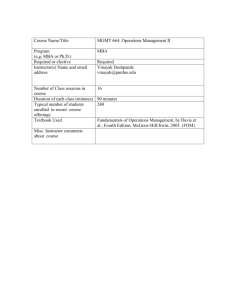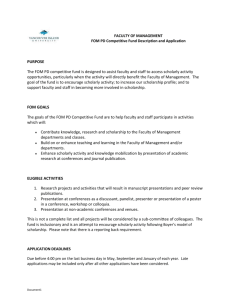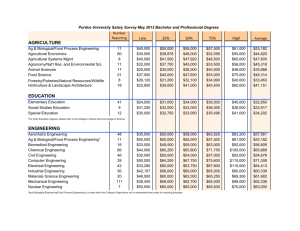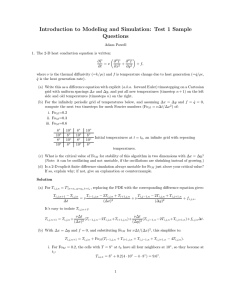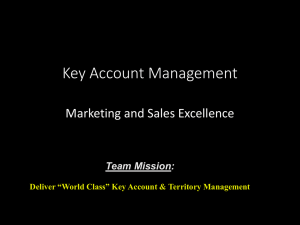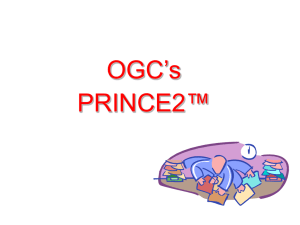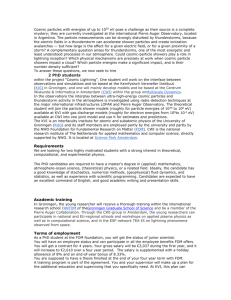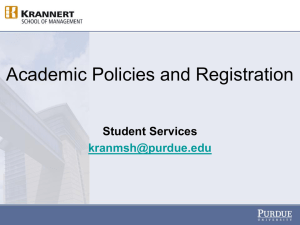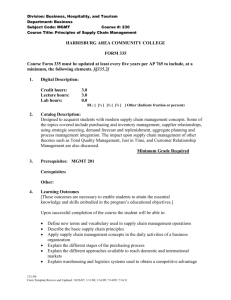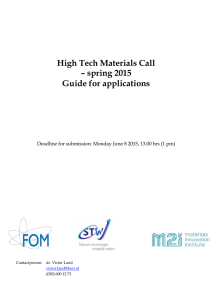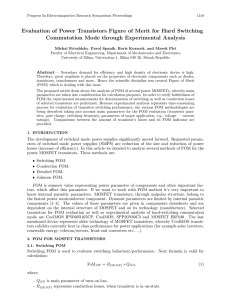1 - POMS
advertisement
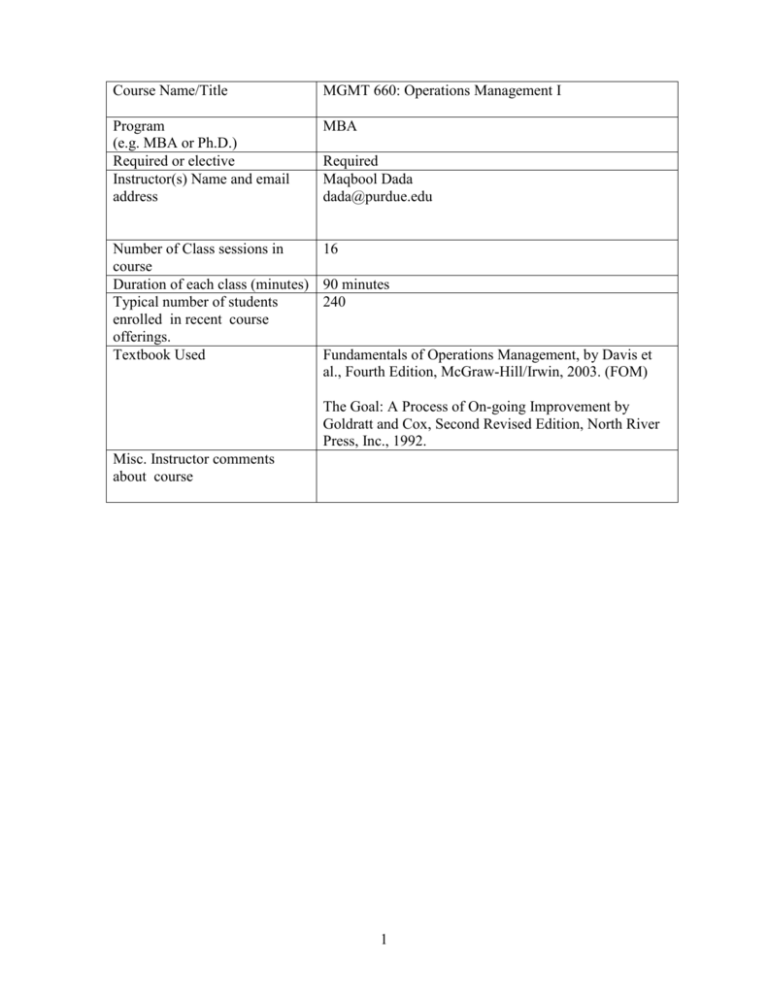
Course Name/Title MGMT 660: Operations Management I Program (e.g. MBA or Ph.D.) Required or elective Instructor(s) Name and email address MBA Number of Class sessions in course Duration of each class (minutes) Typical number of students enrolled in recent course offerings. Textbook Used 16 Required Maqbool Dada dada@purdue.edu 90 minutes 240 Fundamentals of Operations Management, by Davis et al., Fourth Edition, McGraw-Hill/Irwin, 2003. (FOM) The Goal: A Process of On-going Improvement by Goldratt and Cox, Second Revised Edition, North River Press, Inc., 1992. Misc. Instructor comments about course 1 Krannert School of Management MGMT 660: Operations Management Spring 2004 Course Overview As goods and services are produced and distributed, they move through a set of interrelated operations or processes. The design of these operations for strategic advantage, investments in improving their efficacy, and controlling these operations to meet performance objectives is the domain of Operations Management. The primary objective of this course is to provide an overview of this important functional area of business. Taking the process view of the firm we will examine, using case studies, readings and models, a variety of industrial applications. By studying how the manager can improve the efficacy of processes, we will develop a unifying theme to the subject. There are four main themes: Introduction to Process Analysis, Managing Manufacturing Processes, Managing Process Variability, and a manufacturing practicum. By the end of the session, important levers for managing business processes will have been identified. And, how to apply them in alignment with corporate strategic objects will have been demonstrated. The goals of this course are to provide: An overview of Operations Management and Operations Strategy A process view of the firm and tools for analyzing processes An overview for managing manufacturing processes Tools for understanding and managing the impact of process variability A manufacturing game which summarizes the concepts learned in the course While our perspective in MGMT 660 is on conceptual issues in developing a practical perspective on Operations Management, we will use analytical models as appropriate. In the sequel course, MGMT 664, this emphasis is reversed; it will focus primarily on applying analytical tools for inventory management in the context of supply chain management. Course Materials In addition to a course packet (CP), there are two books: Fundamentals of Operations Management, by Davis et al., Fourth Edition, McGrawHill/Irwin, 2003. (FOM) The Goal: A Process of On-going Improvement by Goldratt and Cox, Second Revised Edition, North River Press, Inc., 1992. 2 FOM is the main text for MGMT 660 and 664. The Goal is to be read independently; it introduces in a creative way many of the concepts discussed during the course. Course Grading* The grade for the course will be based on several components: 1. 2. 3. 4. 5. Class Participation (20%) Group Assignments (20%) Book Report on The Goal (10%) Report on the Process Design Flow Exercise (15%) Final Examination (35%) The course is designed to actively engage well–prepared students in class discussion. Since this is an essential element of the pedagogy of the course, class participation accounts for 20% of the grade. For each class session, each student will receive a score of ‘0’, ‘1’ or “2” points. To earn one point, the daily attendance sheet must be signed. To earn an additional point, the student must make a substantial contribution to class discussion. These scores will be posted on Katalyst in a timely manner to provide feedback. There will be no makeup allowed for exams or assignments. Submitted Assignments due: Individual assignment (The Goal) is due on 02/02. Group assignments (self assigned groups of exactly 5, all from the same section) are due on 01/14, 01/21, 01/26, 01/28, 02/02, 02/9, 02/16. Process flow design exercise (Instructor assigned groups) will be conducted in class on 02/23. Reports will be due on 02/23 and 02/25. * University guidelines on Academic Honesty will be strictly enforced. 3 Faculty: Professor Maq Dada (Course Coordinator) Krannert 517 494-4490 E-mail: dada@mgmt.purdue.edu Professor Vinayak Deshpande Rawls 4024 494-6972 E-mail: deshpandev@mgmt.purdue.edu Teaching Assistant: Mayank Kanodia E-mail: kanodia@mgmt.purdue.edu Secretary: Julie Gable Krannert 537 494-4371 E-mail: gablej@mgmt.purdue.edu 4 Course Outline Introduction to Process Analysis Class 1 (01/12) Introduction to Operations Management Reading: FOM Chapter 1 Class 2 (01/14) Operations and Strategy Group Assignment: Wriston Manufacturing Company Introduction to Process Flow Analysis Reading: FOM Chapter 2, Chapter 3 pp.61-65, Chapter 5 pp. 150-167 Class 3 (01/19) Holiday: Rev. Dr. Martin Luther King, Jr. Class 4 (01/21) Process Flow Analysis II Group Assignment: Shouldice Hospital Exercise Class 5 (01/26) Capacity Analysis of Processes Group Assignment: National Cranberry Class 6 (01/28) Improving Business Processes Reading: Reengineering Work: Don’t Automate, Obliterate FOM Chapter 5 pp. 167-174 Group Assignment: Executive Shirts Managing Manufacturing Processes Class 7 (02/02) Using Assembly Line Balancing to Improve Processes Reading: FOM Chapter 8, 322-340 Discussion on The Goal Individual Assignment: Report on The Goal Class 8 (02/04) Optimization Models in Bottleneck Analysis Group Assignment: Red Brand Canners Class 9 (02/09) Process Improvement and Just-in-Time Systems Reading: FOM Chapter 14 Group Assignment: Toyota Manufacturing Company Managing Process Variability Class 10 (02/11) Introduction to Queuing Theory Reading: FOM Chapter 11 including supplement Class 11 (02/16) Queuing Theory II Group Assignment: Manzana Insurance Class 12 (02/18) Operations Scheduling Reading: FOM Chapter 12, pp. 482-498 Recap of Course A Manufacturing Practicum Classes 13 (02/23) and 14 (02/25) The Process Flow Design Exercise Game 5
